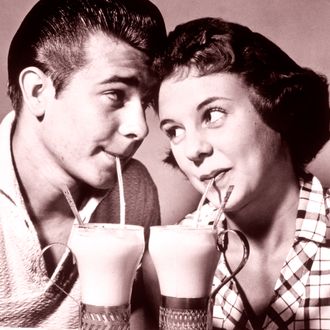
On this week’s Dear Sugar podcast, hosts Cheryl Strayed and Steve Almond read a letter from a 34-year-old single urban woman who bemoans the fact that good guys seem to be “scarce,” wondering if she will have to “settle” with someone. Strayed and Almond mentioned that they’ve recently gotten a steady stream of similar letters from unhappy single women who argue that “all the emotionally available men are spoken for.”
Listening to the show, it sounded at first like your typical advice-column stuff, and like some of those fears must be overblown. But that’s when Strayed and Almond brought in Stanford economics professor Paul Oyer, whose 2014 book Everything I Ever Needed to Know About Economics I Learned From Online Dating chronicled his return to the dating scene as a single, 50-year-old man, which he came to understand as being much like the markets he’d spent a career studying.
Oyer had three observations about the behavioral economics of being (heterosexually) single:
Give up on the idea of finding your soul mate, or risk being “romantically unemployed.” Oyer — who was once an unhappily single man — has this advice for hopeless romantics: “You can’t hold out for the perfect man. He doesn’t exist, and if he did, someone else might have found him by now.” Great.
Instead, Oyer imagines the dating game as being more like finding a job. In economics, workers are looking for firms to hire them, and firms are seeking workers, too. But both firms and workers have incentives to find the perfect version of the other, which can lead to unemployment. Oyer carries this metaphor over to people who are holding out for their soul mate, calling them “romantically unemployed.” He suggests flipping the narrative from “settling” for someone who isn’t perfect to finding a partner “who is really great,” he said. Perfection, in other words, is overrated.
Eligible men are indeed scarcer than available women, especially in major U.S. cities. The women in those letters were not imagining the fact that it seems like there is a dearth of men; this is especially true if you live in urban areas like New York, where females far outnumber males. From Oyer’s economics perspective, this is a simple problem of supply and demand.
That’s why online dating really is a godsend for single people hunting for a relationship. It used to be that you met someone at a bar, a party, or at work. But online dating has drastically increased your available pool of possibilities to include eligible ladies and gents you might not ever have seen or considered — and that’s a good thing. Oyer, himself a man who met his current girlfriend on a dating site, extols their virtues, saying that for a certain population — in his case, a 50-year-old man; in the letter writer’s case, a 34-year-old woman — online dating has made the market thinner. In non-economist terms, that means it’s created fewer obstacles to entering the market and more possibilities for a person to find their partner. You don’t need an economics degree to know that’s a lovely thing.




